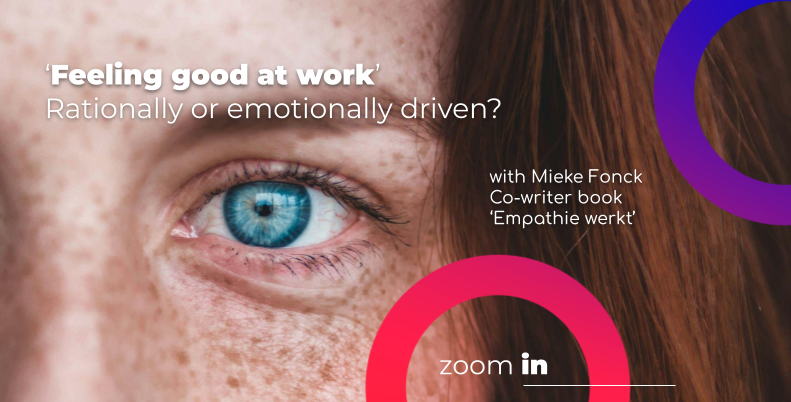Feeling Good at Work: Rational or Emotional?
Through the eyes of Evelyne Sinnaeve, Employee Communications Director

In my new inspirational series "Zoom In," I share tips and insights on employer branding and impactful internal communication campaigns. I do this through interviews, and my first expert is The Oval Office colleague Mieke Fonck. She is an employee communication strategist and, along with Bart De Leeuw, the author of the book "Empathy Works." I asked her: is feeling good at work rational or emotional?
"Feeling good at work is purely about emotion," Mieke responds. "Liking where you work is all about fulfilling emotional needs: safety, appreciation, belonging, being yourself, having an impact..."
I play the devil's advocate and mention that salary and other rational factors top the list year after year in Randstad surveys.
Mieke: "Of course, money is an important part of why we work: after all, we want to live comfortably. But you have to see money as a means to meet our needs, not as an end in itself. It's an extrinsic motivator, while we see that employee engagement is actually determined by intrinsic motivators. Such as having a clear purpose, experiencing social cohesion, being yourself, and being able to develop."
Intrinsic Motivators Determine Employee Engagement
Isn't it strange, then, that companies use mainly rational arguments in their job ads, like a competitive salary or working from home? Mieke: "It is difficult to articulate the emotional aspects. Moreover, what is 'fun' for one colleague is not necessarily the same for another. A well-developed employer value proposition can help HR professionals articulate emotional factors like pride or the ability to make mistakes."
"We shouldn't throw out those rational arguments either: although we often make emotional choices as humans, we still want to rationally justify those choices – a mechanism beautifully explained in Daniel Kahneman's book 'Thinking, Fast and Slow.'"
From Empathy to Job Satisfaction
If emotions drive our job satisfaction, does that mean employer empathy plays a significant role too? "Absolutely," Mieke answers. "In October 2022, we conducted a study with consultancy firm Human8, which shows that empathetic employers clearly perform better on key KPIs. Employees with an empathetic employer are over four times more likely to recommend their organization to potential candidates – a huge advantage in the war for talent."
"A clearly defined employer brand is therefore important to attract the right talent and will only become more important: we see that younger employees attach much more importance to an employer that aligns with their values. Research shows that as many as 52 percent of Gen Z have already turned down a job because there was no match with the company values. A clear and thoughtful employer brand helps attract the right candidates during the selection process."
Empathetic Employers Score Better on Key KPIs
Empathy makes you not only more attractive as an employer but also increases engagement: employees who consider their employer empathetic are three times more satisfied with their work and identify three times more with their employer. Sounds great, but how do you concretely translate empathy to the workplace? Mieke: "From our research, we identified five empathetic triggers: understanding, honesty, being yourself, support, and open and transparent communication. In our book 'Empathy Works,' we delve deeper into this."

A Practical Handbook
Finally, I want to know where Mieke got the inspiration to write a book about empathetic communication with employees.
"As an agency, we strongly believe in the power of empathy," she responds. "Moreover, our research showed that it really works. An extra motivation was our conviction that we need empathy in the current context of polarization. That's why we wanted to write a practical handbook with tips and tricks on how to apply empathy as a brand or employer. So that everyone can contribute to more empathy."
Can Mieke maybe share the ultimate tip as a teaser? "That empathy is more than understanding each other. You have to act on it too!"
Curious about the book? Let me know in a comment why you'd like to win it, and who knows, it might come your way with much empathy soon!

📧 Want more insights on strong employer branding and impactful internal communication campaigns based on my over 25 years of experience in communication? Connect and I'll inspire: evelyne@theovaloffice.be